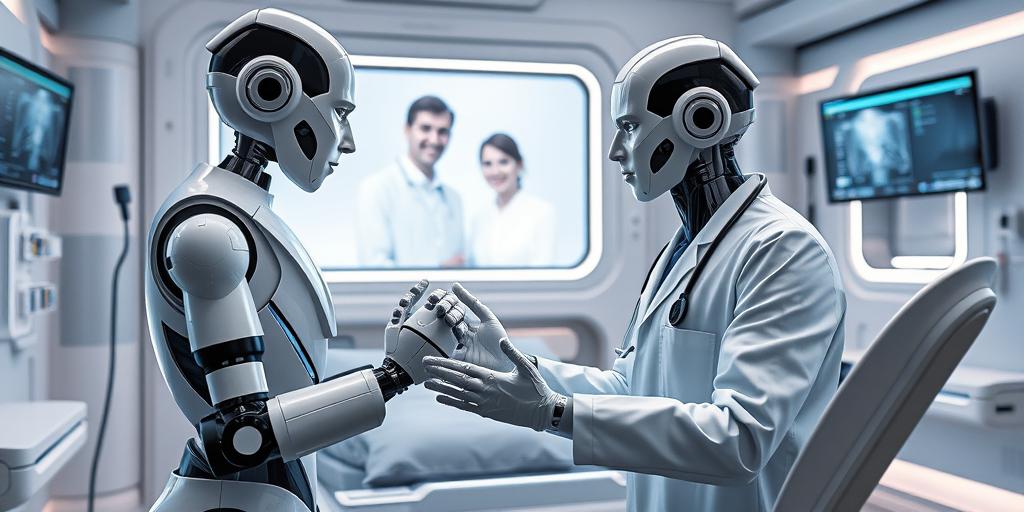The field of medicine is undergoing a transformative revolution, fueled by the rapid advancements in AI in medicine. From diagnosing diseases to developing new treatments, artificial intelligence is poised to reshape the healthcare landscape as we know it. While some may wonder if AI will replace doctors altogether, the reality is far more nuanced. AI is not meant to replace human expertise but rather to augment it, enhancing the capabilities of medical professionals and improving the quality of patient care.
The Rise of AI in Healthcare
The integration of artificial intelligence in healthcare is rapidly expanding, driving innovation across various aspects of medical practice.
AI-Powered Diagnosis and Treatment
AI algorithms are being trained on vast datasets of medical images, patient records, and research papers to assist doctors in diagnosing diseases with greater accuracy and speed. AI-powered imaging analysis tools can detect subtle abnormalities in scans that might be missed by the human eye, leading to earlier and more accurate diagnoses. Furthermore, AI algorithms can analyze patient data to predict potential complications and recommend personalized treatment plans, ensuring optimal outcomes for patients.
AI in Drug Discovery and Development
AI is revolutionizing the process of drug discovery and development, accelerating the pace of research and reducing costs. AI algorithms can analyze massive datasets to identify potential drug targets and predict the effectiveness of new drugs, significantly streamlining the drug development pipeline. This has the potential to bring new treatments to market faster, benefiting patients who need them most.
AI for Personalized Medicine
Personalized medicine is a growing area of healthcare where treatments are tailored to individual patients based on their unique genetic makeup and other factors. AI algorithms can analyze patient data to identify specific genetic markers that may predict disease risk and personalize treatment plans. This personalized approach can lead to more effective treatments and better outcomes for individual patients.
AI’s Potential to Enhance Medical Care
The integration of AI in healthcare holds the potential to significantly enhance medical care in numerous ways.
Improved Accuracy and Efficiency
AI can help doctors make more accurate diagnoses and treatment decisions, leading to better patient outcomes. By analyzing large datasets, AI algorithms can identify patterns and relationships that might be missed by humans, leading to a more comprehensive understanding of a patient’s condition. This can also improve the efficiency of medical processes, freeing up doctors’ time to focus on patient care rather than administrative tasks.
Early Detection and Prevention
AI-powered tools can be used to detect diseases in their early stages, when they are more treatable. For example, AI algorithms can analyze medical images to screen for cancer or other conditions, allowing for early intervention and improved chances of recovery. AI can also be used to identify individuals at risk of developing certain diseases, enabling preventive measures and potentially preventing the onset of illness altogether.
Enhanced Patient Care and Experience
AI can improve the patient care experience by providing personalized support and information. AI-powered chatbots can answer patient questions, schedule appointments, and provide reminders, improving communication and reducing the burden on medical staff. AI can also be used to develop patient-centric apps that provide personalized health recommendations and track patient progress, empowering individuals to take charge of their health.
The Limitations of AI in Medicine
While the potential of AI in medicine is enormous, it’s important to acknowledge the limitations and challenges that need to be addressed.
Data Bias and Ethical Concerns
AI algorithms are trained on massive datasets, and if these datasets contain biases, these biases can be reflected in the algorithms’ outputs. This can lead to unfair or discriminatory treatment of patients. Furthermore, ethical concerns arise regarding data privacy and security, as well as the potential for AI to be used in ways that are not in the best interests of patients.
Lack of Human Empathy and Intuition
AI algorithms are not capable of understanding and responding to complex human emotions. They lack the empathy, intuition, and nuanced judgment that are essential for effective doctor-patient communication. While AI can provide objective data and recommendations, it cannot replace the human touch and understanding that are crucial for providing compassionate and supportive care.
Regulatory and Legal Challenges
The development and deployment of AI in healthcare raise a number of regulatory and legal challenges. These challenges include the need for clear standards and guidelines for the use of AI in medicine, as well as the need to ensure that AI systems are safe and effective.
The Future of AI and Medicine: Collaboration, Not Replacement
The future of AI in medicine lies not in replacing doctors but in empowering them with tools and insights that enhance their capabilities and improve patient care.
AI as a Tool for Doctors
AI should be viewed as a powerful tool that can assist doctors in making more informed decisions, providing more personalized care, and improving efficiency. AI can analyze vast amounts of data, detect subtle patterns, and generate personalized recommendations, but ultimately, the final decision-making should remain in the hands of human doctors.
The Importance of Human-AI Partnerships
The most effective approach to AI in medicine involves a close partnership between humans and AI. Doctors need to work closely with AI systems, understanding their capabilities and limitations, and using them to complement their own expertise. This collaborative approach will maximize the benefits of AI while ensuring that human judgment and empathy remain central to patient care.
The future of healthcare is one where AI and humans work together to improve the lives of patients. By embracing the potential of AI while acknowledging its limitations, we can create a healthcare system that is more efficient, personalized, and effective than ever before. AI will not replace doctors; it will augment their capabilities, enabling them to provide better care and unlock new possibilities for improving human health.




